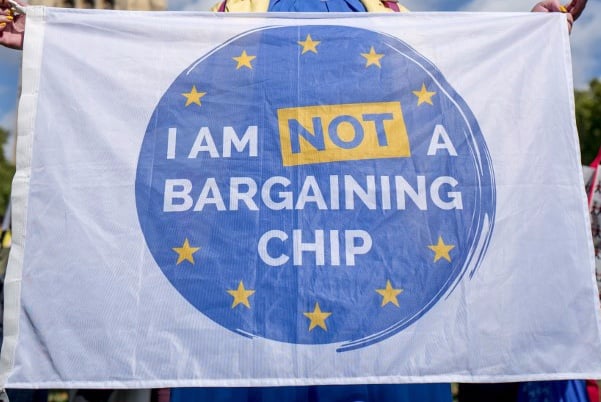What will you be doing on Friday night at 11 pm (or midnight)?
Like many British people on the continent, I haven’t decided. I fluctuate between wanting to mark Brexit quietly but symbolically with some friends in Berlin, or just staying home with my husband and going across the road to our local bar for a couple of strong cocktails.
Or maybe just going to bed and hiding under the duvet.
Whatever I end up doing, the mood deep down will be sadness.
Then there is the exhaustion and physical toll from three years of campaigning to limit the damage that Brexit is causing to the 1.3 million of us who live in an EU 27 country.
 Jane Golding gives a presentation to the Joint EP Committee Citizens' Rights hearing. Photo: Screengrab udiovisual.ec.europa.eu
Jane Golding gives a presentation to the Joint EP Committee Citizens' Rights hearing. Photo: Screengrab udiovisual.ec.europa.eu
And watching first-hand how the government that is supposed to be fighting our corner has led the race to the bottom in removing the indispensable rights on which we have built our lives has made me wonder what the value of British citizenship is – if this government had really cared about our rights, they would have made good on their pledge to give us back our votes in the Referendum and last three national votes.
There is also the frustration of how we have been portrayed in some of the media – obviously I didn’t move to Berlin for a place in the sun!
But I will be with my German husband and that matters hugely.
You see, he understands, as a former GDR citizen, about hard borders and separation. He knows why free movement is important to me and he frankly doesn’t understand why anyone would want to go backwards.
And binational marriages and relationships between UK and other EU citizens like ours are a key part of the integration that has been fundamental to the success of the European project. We’re together, but not the same – and that’s a good thing.
At its heart, the European project is one of peace, solidarity and cooperation, designed to bring people and cultures together, so that conflict becomes unthinkable.
This is what my British father who, aged 20, was moving across Europe with the Allies and my German father-in-law who, aged 16, survived the bombing of Dresden, hoped for – for their children and their grandchildren.
 British in Europe's Jane Golding (centre) and Kalba Meadows (left) along with the3million's Nicolas Hatton deliver a message to Downing Street. Photo: AFP
British in Europe's Jane Golding (centre) and Kalba Meadows (left) along with the3million's Nicolas Hatton deliver a message to Downing Street. Photo: AFP
Together with our 3 million EU friends living in the UK, we make up nearly one third of all EU citizens who use their free movement rights.
We are the people who have seized all the opportunities that EU citizenship and the fundamental freedoms have given us and taken them far beyond what the founding fathers dreamt of. The children of the European project.
This is why losing free movement and its associated cross border working rights are such an emotional blow for many. Under the Withdrawal Agreement Brits in the EU will be able to stay and work in the country that they are resident in on Brexit day. This is a welcome step. But it is limited to that one country.
Note that FREEDOM OF MOVEMENT is not included so many of us face our businesses crumbling and our dreams being destroyed as we become landlocked if this is not resolved in the coming negotiations.
— British in Europe (@BritishInEurope) January 29, 2020
This loss of free movement has practical consequences for the 80 percent of us who are working age or younger. For many, crossing a border for work is like going out to buy bread. It’s something we do every week. Without it, many actual breadwinners will struggle to pay their rents, mortgages and provide for their families as they simply won’t be as attractive to employers or clients anymore.
We want to be able to carry on fighting for free movement as a priority in the future relationship negotiations. But campaigning has taken an economic (as well as emotional) toll on our volunteers, many of whom are working full time, and have families themselves.
This is why we are asking supporters of our work to consider setting up a standing order to help us carry on our work in Phase 2 of the negotiations. Someone needs to stand up for UK nationals on the continent. If the British Government isn’t going to do it or give us our votes back, it looks as though it will have to be us.
To find out more about how to donate to British in Europe you can CLICK HERE.
In the week running up to Brexit, British in Europe have been publishing detailed analysis of the Withdrawal Agreement and what it means for Britons across the EU. You can find out more HERE.




 Please whitelist us to continue reading.
Please whitelist us to continue reading.
Member comments